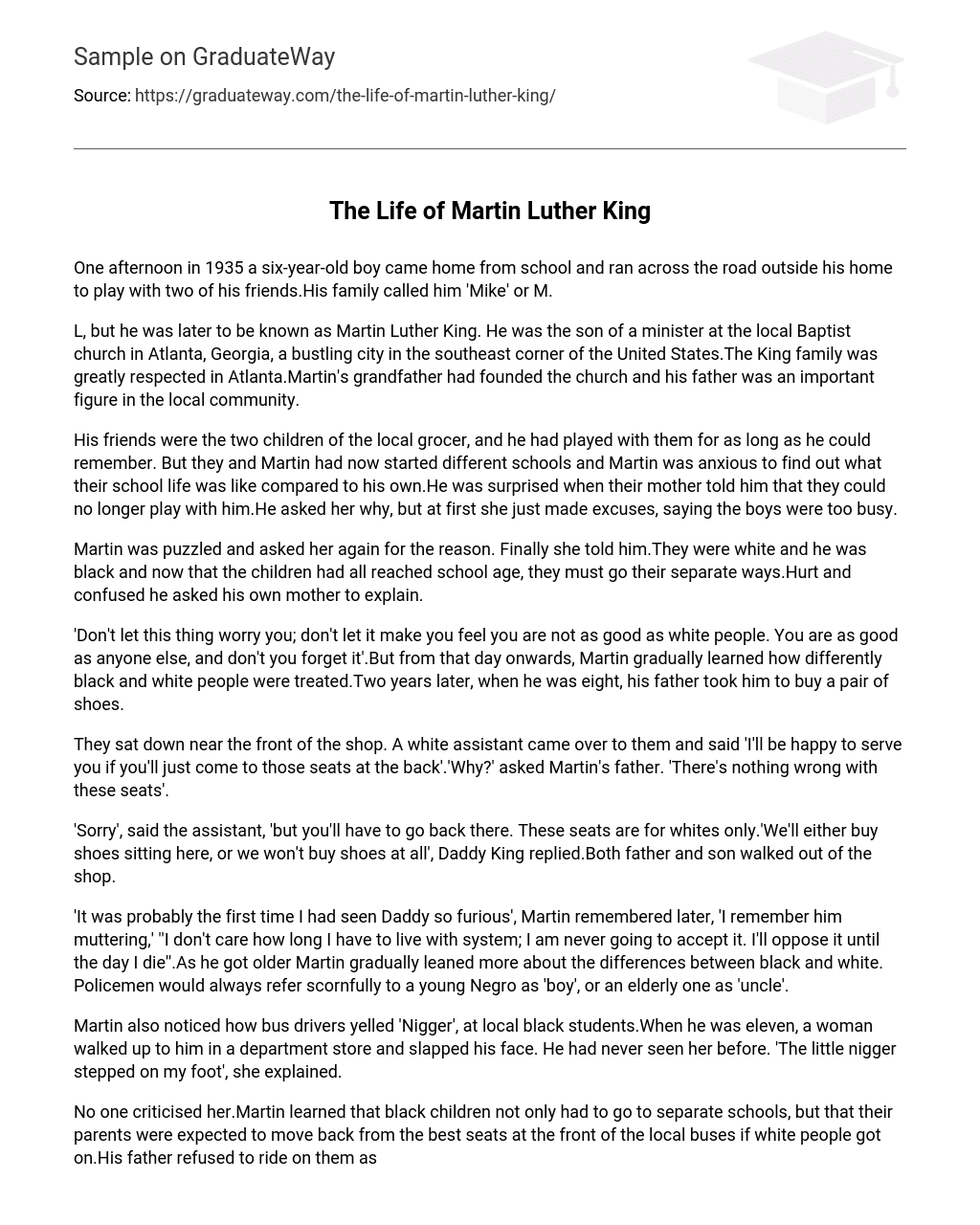One afternoon in 1935 a six-year-old boy came home from school and ran across the road outside his home to play with two of his friends.His family called him ‘Mike’ or M.
L, but he was later to be known as Martin Luther King. He was the son of a minister at the local Baptist church in Atlanta, Georgia, a bustling city in the southeast corner of the United States.The King family was greatly respected in Atlanta.Martin’s grandfather had founded the church and his father was an important figure in the local community.
His friends were the two children of the local grocer, and he had played with them for as long as he could remember. But they and Martin had now started different schools and Martin was anxious to find out what their school life was like compared to his own.He was surprised when their mother told him that they could no longer play with him.He asked her why, but at first she just made excuses, saying the boys were too busy.
Martin was puzzled and asked her again for the reason. Finally she told him.They were white and he was black and now that the children had all reached school age, they must go their separate ways.Hurt and confused he asked his own mother to explain.
‘Don’t let this thing worry you; don’t let it make you feel you are not as good as white people. You are as good as anyone else, and don’t you forget it’.But from that day onwards, Martin gradually learned how differently black and white people were treated.Two years later, when he was eight, his father took him to buy a pair of shoes.
They sat down near the front of the shop. A white assistant came over to them and said ‘I’ll be happy to serve you if you’ll just come to those seats at the back’.’Why?’ asked Martin’s father. ‘There’s nothing wrong with these seats’.
‘Sorry’, said the assistant, ‘but you’ll have to go back there. These seats are for whites only.’We’ll either buy shoes sitting here, or we won’t buy shoes at all’, Daddy King replied.Both father and son walked out of the shop.
‘It was probably the first time I had seen Daddy so furious’, Martin remembered later, ‘I remember him muttering,’ ”I don’t care how long I have to live with system; I am never going to accept it. I’ll oppose it until the day I die”.As he got older Martin gradually leaned more about the differences between black and white. Policemen would always refer scornfully to a young Negro as ‘boy’, or an elderly one as ‘uncle’.
Martin also noticed how bus drivers yelled ‘Nigger’, at local black students.When he was eleven, a woman walked up to him in a department store and slapped his face. He had never seen her before. ‘The little nigger stepped on my foot’, she explained.
No one criticised her.Martin learned that black children not only had to go to separate schools, but that their parents were expected to move back from the best seats at the front of the local buses if white people got on.His father refused to ride on them as a result.It also became clear to Martin that only whites could hold many of the top jobs in the city.
Martin was learning the bitter lesson that all black people of his age then had to learn- that Negroes in the South were treated as second-class citizens just because of the colour of their skin. It was a lesson that was to shape the whole course of his future life.Racial discrimination (treating blacks differently from whites) and segregation (keeping them separate from whites) went back a long way in American history.Over 300 years before Martin Luther King was born, the first black slaves were brought from West Africa to America and the West Indies to work.
At this time, these slaves had to legal rights at all. White men could buy them and sell them like pieces of furniture. The men came looking for strong plantation workers and their wives tried to find servants who would do all the housework.Many people realised that the slave trade was wrong.Laws were passed in both Britain and America in 1807-8 to make it illegal, but some people could still dodge the system and many illegal slave trading continued to happen.





